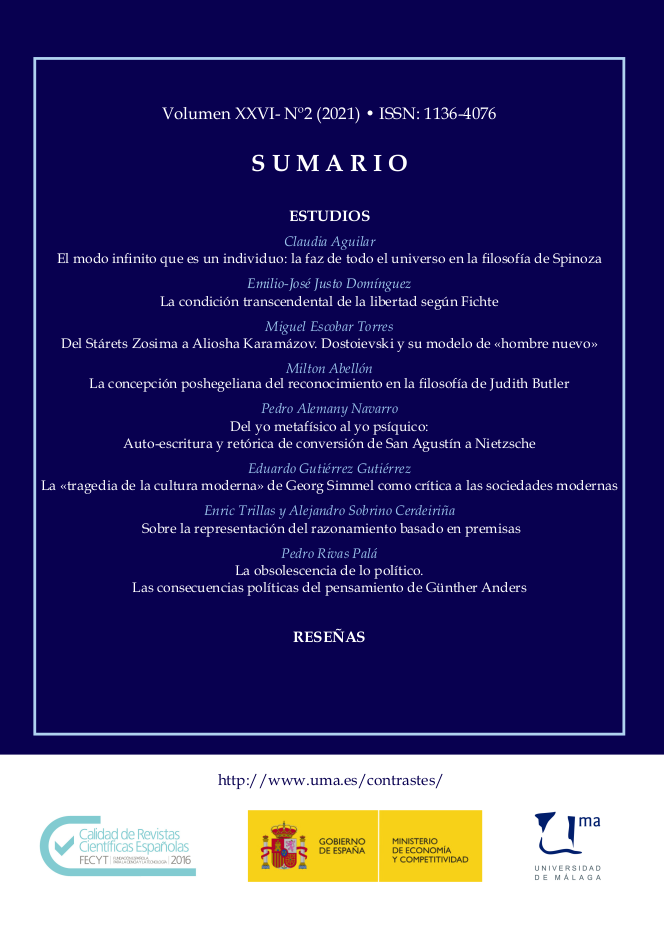The Infinite Mode that an Individual is: the Face of the Whole Universe in Spinoza's Philosophy
DOI:
https://doi.org/10.24310/Contrastescontrastes.v26i2.9545Keywords:
SPINOZA, INDIVIDUAL, INFINITE MODES, FACE OF THE WHOLE UNIVERSEAbstract
The analysis of the Spinozian infinite modes has been extremely varied. This article intends to highlight the relevance of infinite modes without denying their peculiarity, that is, without confusing them with both finite modes and substance. My hypothesis is, firstly, that infinite modes are eternal and not sempiternal. Secondly, that infinite modes, particularly the face of the whole universe, are indispensable to consider the relationships part-whole, substance-modes, substance - finite modes, and even intramodal relationships.
Downloads
Metrics
Publication Facts
Reviewer profiles N/A
Author statements
Indexed in
-
—
- Academic society
- N/A
- Publisher
- Universidad de Málaga
References
DELEUZE, G. 1999: Spinoza y el problema de la expresión, trad. por H. Vogel. Barcelona: Muchnik.
DUJOVNE L. 2015: Spinoza. Su vida, su época, su obra, su influencia, 4 tomos. Buenos Aires: Biblioteca Nacional.
GAINZA, M., (EN PRENSA): “El problema del infinito en Spinoza. El arte de la distinción”, Ideas y Valores. Revista Colombiana de Filosofía, nº 175, Facultad de Ciencias Humanas de la Universidad Nacional de Colombia, Bogotá, Colombia.
KIZUK, S., 2014: Individuation and individuality: a reading of Spinoza's physical interlude. Tesis de Maestría: Memorial University of Newfoundland.
KLEIN, J., 2002: “«By Eternity I Understand»: Eternity According to Spinoza”, The Jerusalem Philosophical Quarterly, Nro.51, pp. 295-324.
LERUSSI, N., 2008: “Sobre la noción de cuerpo en Spinoza” en TATIÁN, D. (comp.): Spinoza. Cuarto coloquio. Córdoba: Brujas.
MELAMED,Y., 2013: Spinoza's Metaphysics Substance and Thought. Nueva York: OUP.
PETERMAN, A., 2015: “Spinoza on extension”, Philosophers' Imprint, Nro. 15, PP. 1-23.
PETERMAN, A., (EN PRENSA): “The world soul in early modern philosophy” en Oxford Philosophical Concepts: The World Soul.
PRIMUS, K., 2019: “Spinoza’s «Infinite Modes» Reconsidered”, Journal of Modern Philosophy, 1(1). DOI: http://doi.org/10.32881/jomp.69).
RIBEIRO FERREIRA, M. L., 2012: “«Um verme no sangue» -considerações sobre a relação Todo/partes na filosofia de Espinosa”, Revista de Filosofía. Universidad Iberoamericana, N° 133, pp. 57-81.
SACKSTEDER W., 1985: “Simple Wholes and complex Parts: Limiting principles in Spinoza”, Philosophy and Phenomenological Research, Vol. 45, No. 3, Marzo.
SACKSTEDER W., 1977: “Spinoza on Part and Whole: The Worm's Eye View”, The Southwestern Journal of Philosophy, Vol. 8, No. 3, Spinoza Issue, otoño, , pp. 139-159.
SCHMALTZ, T., 1997: “Spinoza’s Mediate Infinite Mode”, Journal of the History of Philosophy 35 (2). DOI: https://doi.org/10.1353/hph.1997.0024).
SCHMITT, E., 1910: Die undendlichen Modi bei Spinoza. Leipzig: Barth.
SIBILIA, G., 2017: De la producción eterna de lo real al tiempo vivido. Ontología y temporalidad en Spinoza. Tesis doctoral, Universidad de Buenos Aires.
SPINOZA, B., 1925: Opera quae supersunt omnia, Heidelberger Akademie der Wissenschaften, editada por Carl Gebhardt, 4 tomos. Heidelberg: Carl Winter-Verlag.
SPINOZA, B., 1980: Spinoza, B. Ética demostrada según el orden geométrico, trad. por V. Peña. Madrid: Editora Nacional.
SPINOZA, B., 1988: Correspondencia, trad. por A. Domínguez. Madrid: Alianza.
Downloads
Published
How to Cite
Issue
Section
License
This journal provides immediate free access to its content under the principle of making research freely available to the public. All content published in Contrastes. Revista Internacional de Filosofía, are subject to the Creative Commons Attribution-NonCommercial-ShareAlike 4.0 license whose full text can be found at <http://creativecommons.org/licenses/by-nc-sa/4.0>
It is the responsibility of the authors to obtain the necessary permissions of the images that are subject to copyright.
Authors whose contributions are accepted for publication in this journal will retain the non-exclusive right to use their contributions for academic, research and educational purposes, including self-archiving or repository in open access repositories of any kind.
The electronic edition of this magazine is edited by the Editorial Service of the University of Malaga (Uma Editorial), being necessary to cite the origin in any partial or total reproduction.










5.png)
